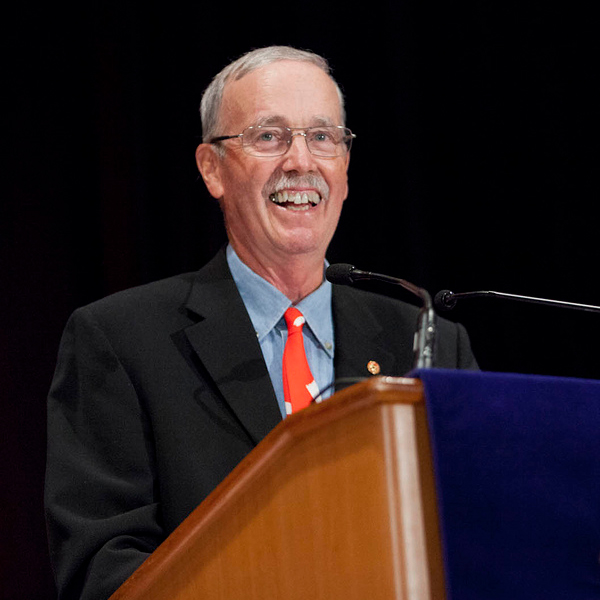Over the course of his life, Charles Bronfman, LLD’90, has been a business leader (most notably at Seagram, once one of the most dominant players in the liquor industry), as well as one of Canada’s best-known philanthropists. But Montrealers of a certain age will always remember him fondly for one thing in particular – as the man who brought Major League Baseball to town (you could argue that legendary Montreal mayor Jean Drapeau deserves much of the credit, but it’s hard to imagine the Montreal Expos existing without Bronfman).
Bronfman recently visited McGill to announce an endowment of $5 million to create Conversations, sponsored by Charles Bronfman, a new discussion series that will involve prominent Canadian and international experts. The Conversations series will be launched next year, and it will be run by another institution that wouldn’t have existed without Bronfman’s support – the McGill Institute for the Study of Canada.
When I sat down for a chat with him, I began by thanking him for providing part of the soundtrack of my childhood.
I grew up near Jarry Park, I explained, back when the Montreal Expos were playing baseball there in the 1970s, and the distinctive voice of Claude Mouton, the stadium’s public address announcer, could be heard for blocks around the park.
Bronfman grins. He knows what’s coming next and he beats me to the punch. “John Boc-ca-bell-a!” Bronfman playfully exclaims, mimicking the flair with which Mouton regularly introduced the Expos catcher.
Bronfman was the principal owner of the Expos from their first season in 1969 until the team was sold in 1991. His departure marked the beginning of the end for the team. The Expos would never again enjoy the same kind of stability or support from its owners.
Does it still do his heart good when he spots someone wearing an Expos cap? “Oh, yes,” he quickly replies. But not all the memories are pleasant. “People ask me if I still think about Blue Monday,” says Bronfman of the fateful 1981 playoff game when a two-out ninth-inning home run by Los Angeles Dodgers outfielder Rick Monday destroyed the best hope the Expos ever had of playing in the World Series. “That [memory] will never leave me.”
Thankfully, Bronfman’s long association with the McGill Institute for the Study of Canada brings up much happier recollections.
It was Bronfman’s support that made the creation of MISC in 1994 possible, and he served as one of the first co-chairs of the institute’s board of trustees. He had already been thinking of creating an institute like MISC to foster dialogue around the major issues that Canada was facing when he received a visit from David Johnston, then McGill’s principal.
“I hadn’t thought of doing it with a university until [McGill] came along. There are pluses and minuses to working with a university. One of the big pluses is that you immediately get recognition. And it probably allows you to get a better director than you might otherwise be able to get. The minuses are that you are tied to the university, and you don’t have total freedom of action.” Working with McGill was something of a leap of faith given that his initial inclination was to go it alone. Twenty-eight years later, Bronfman is pleased with the results.
He remembers the spirited discussions that took place during MISC’s first conference, which focused on Quebec sovereignty. “That got us off to a great start,” he says.
“Everything depends on people, it really does,” adds Bronfman. He pays tribute to MISC’s first director, the late Desmond Morton. “Without Des, I’m not so sure we’d be here today.” He says MISC has been blessed over the years with strong leadership, singling out Morton, his successor Antonia Maioni, and MISC’s current director Daniel Béland for special praise.
Béland describes Bronfman’s most recent gift to MISC as “a game-changer” and says MISC will seek out “high-profile speakers” to take part in the Conversations series.
“We are using the name Conversations because we want to shy away from pure polemics and have really thoughtful discussions about the major challenges and opportunities facing Canada,” says Béland. “We are thinking about the role of Canada in the world – how the world impacts us and how Canada can impact the world. The audience will be broad. This isn’t just for academics or policymakers.” While Conversations events will take place in person, they will also be streamed and recorded so that anyone anywhere can tune in.
On the subject of philanthropy, Bronfman is contemplative. Giving away money is harder than most people imagine – or at least it is if you want to have a tangible impact on the causes that matter to you the most.
“There are many people who say, ‘I’ve done very well in business, so if I know how to make money, I’ll know how to give it away.’ Not true. It’s like anything else in life. If you want to be good at it, you have to put in the hours. In some ways, it’s like [running] a business. You think about building your team, you think about your goals, you measure your success or your failure, you drop the things that aren’t working, and you make adjustments.”
Bronfman, who signed the Giving Pledge, making the commitment to give away most of his wealth to charitable causes, says his philanthropy tends to target a few specific areas. “My niche has been in helping Canadians to know more about Canada and its heritage, and in helping Jews to know more about Israel.”
He is the co-founder of Birthright Israel, a hugely successful program that offers young Jewish adults the opportunity to take part in a free educational trip to Israel with the hope of fostering an emotional connection to the country (more than 800,000 have taken part in the program). In Canada, Bronfman’s CRB Foundation has long been the driving force behind the Heritage Minutes, short, well-crafted dramatizations that spotlight important people and events from Canadian history – including McGillians like John Humphrey (who wrote the first draft of the UN’s Universal Declaration of Human Rights) and pioneering neurosurgeon Wilder Penfield.
That focus on Canada and on encouraging Canadians to take pride in their country’s accomplishments and to think deeply about its place in the world, extends to MISC and the new Conversations series.
“We have something precious here in Canada,” says Bronfman. “I wonder if we really understand that sometimes. We should be playing a leadership role for medium-sized countries in the world. At the end of the day, you hope Canadians are more aware of how special this place is.”


